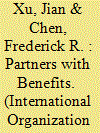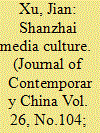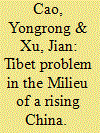| Srl | Item |
| 1 |
ID:
191908


|
|
|
|
|
| Summary/Abstract |
Scholars often assume that courts in authoritarian regimes cannot credibly protect foreign investors’ interests because these institutions lack judicial independence. In this article, we construct a novel data set on multinational corporations’ litigation activities in Chinese courts from 2002 to 2017. This supports the first systematic case-level analysis of foreign firms’ lawsuit outcomes in an authoritarian judiciary. We find that foreign companies frequently engage in litigation in authoritarian courts. Moreover, we theoretically and empirically distinguish between two types of government–business ties in terms of their effectiveness in incentivizing the host state to protect foreign investors’ interests. We argue that ad hoc, personal political connections deliver only trivial lawsuit success for multinational enterprises, while formal corporate partnerships with regime insiders can lead the state to structurally internalize foreign investors’ interests. In particular, we demonstrate that joint venture partnerships with state-owned enterprises help foreign firms obtain more substantial monetary compensation than other types of multinational enterprises. By contrast, the personal political connections of foreign firms’ board members do not foster meaningful judicial favoritism. These findings are robust to tests of alternative implications, matching procedures, and subsample robustness checks. This article advances our understanding of multinational corporations’ political risk in host countries, government–business relations, and authoritarian judicial institutions.
|
|
|
|
|
|
|
|
|
|
|
|
|
|
|
|
| 2 |
ID:
153385


|
|
|
|
|
| Summary/Abstract |
This article studies shanzhai media culture, a specific type of shanzhai culture that copycats the most-watched shows of China Central Television (CCTV) with a sense of satire and play. The article discusses why CCTV has become a popular target of shanzhai, how CCTV’s brand shows are shanzhai-ed and what are the political implications of shanzhaing these established programs. By presenting Lao Meng’s Shanzhai Spring Festival Gala as a case study, the author argues that shanzhai media culture is a creative, participatory and Internet-facilitated grassroots media production, which attempted to resist and intervene in the power–money hegemony of CCTV underpinned by the disingenuous neoliberal logic of Chinese media. However, this culture failed to do so and has been co-opted and reshaped by the powerful logic it attempted to challenge.
|
|
|
|
|
|
|
|
|
|
|
|
|
|
|
|
| 3 |
ID:
137451


|
|
|
|
|
| Summary/Abstract |
The Lhasa riots in 2008 re-captured the world's attention on the Tibet problem. As China continues to grow as a rising power, it raises a concern over whether the perception of a rising China will affect how American people think about the Tibet problem. In this article, the authors apply public opinion data to evaluate this question. The results show that the perception of China's hard power or soft power has little influence on Americans' view of the Tibet problem, while factors of political values and China's policy stance matter greatly. Our findings suggest that the huge difference in political values between the PRC and the US makes it tough for both sides to agree on a resolution to the Tibet problem. In the long term, China needs to improve its human rights record and present itself as a responsible great power to win over the hearts of foreign publics rather than conduct a public relations campaign according to its own imagination.
|
|
|
|
|
|
|
|
|
|
|
|
|
|
|
|